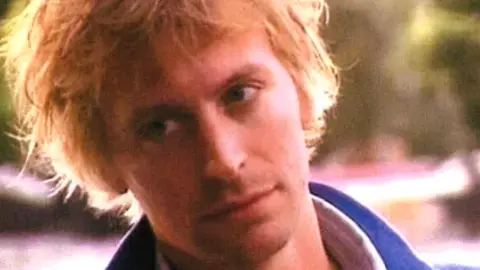MH17: One father's testimony marked by despair and a rucksack
 Wim van der Graaff
Wim van der Graaff"Time keeps on requiring endless patience. We are still waiting for someone to take responsibility."
Wim van der Graaff is giving testimony at the trial of four men accused of shooting the MH17 passenger jet out of the sky in 2014, as it flew over Ukraine.
On the desk in front of judge Hendrik Steenhuis he has hung a rucksack.
It belonged to his 30-year-old son Laurens and was recovered undamaged from the wreckage at the crash site.
Laurens was killed along with 297 others on their way from the Netherlands to Malaysia. International investigators say the plane was shot down with a missile fired by pro-Russian rebels.
Wim van der Graaff takes the blue-and-grey rucksack with him every time he talks about Laurens' final journey.
And it is only now, seven years after losing his son, that the men - three Russians and a Ukrainian - are standing trial accused of downing the plane. They all deny involvement. None of them are appearing in court and, if convicted, they are unlikely to ever be extradited to face justice.
Allow X content?

Mr Van der Graaff, whose wife Gerda sat beside him in the courtroom in the Schiphol airport complex, is one of dozens of relatives of victims who are speaking during the 10 days allocated for family testimony.
He detailed the endless pain of losing their child.
"I dreamt someone handed me a self-help book. I opened it and all the pages were blank. Was I meant to reinvent myself? In another dream, I'm standing next to my broken down car, I'm calling on a disconnected emergency phone. Despair."
Laurens van der Graaff was a teacher in Amsterdam. He was going on a dream holiday to Bali with Karlijn Keijzer, his girlfriend.
His father described a young man deeply in love, in the prime of his life - and spoke of the anguish of not knowing who killed his son.
The men on trial are two alleged Russian military intelligence agents, Sergey Dubinsky and Oleg Pulatov, as well as Igor Girkin, a former colonel in Russia's FSB intelligence agency, and Leonid Kharchenko, a Ukrainian citizen with no military background.
Prosecutors accuse them of bringing a surface-to-air missile across the border from Russia to a launch site in eastern Ukraine and killing all 298 people on board the plane.
Mr Van der Graaff used a train metaphor throughout his testimony.
He sees himself sitting in a long train that stops nowhere and hurtles on to a destination unknown. All passengers are affected by his loss.
In his imaginary train was his grief therapist with whom he had conversations after the death of Laurens. He still struggles with how to deal with it.
Mr Van der Graaff also praised the role of the family detectives, who returned the backpack to him, as well as his son's recovered sunglasses. And the news that Laurens and Karlijn had been found.
He continues with the metaphor about the train and his walk through the compartments in which he met friends of Laurens, students and all kinds of other related people.
The landscape behind the windows is unfamiliar, scary. After the attack, he lived in the hope that his son, who was in good condition, would have survived the fall and landed in a soft haystack.
Mr Van der Graaff says he is still in the imaginary train. He doesn't know where it will ever stop and the emergency brake is broken. There is nothing for it but to sit in his place.

